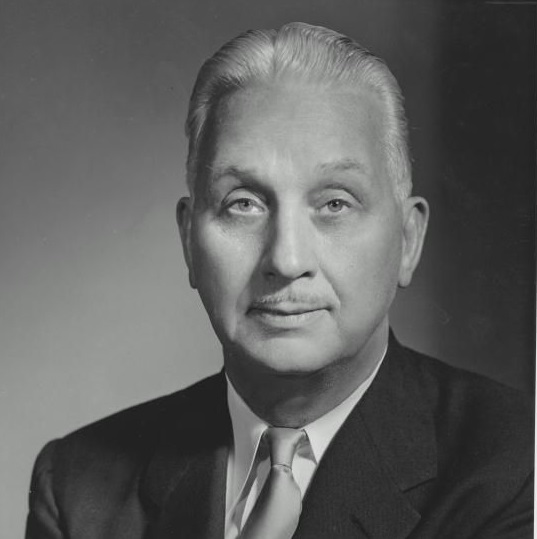Cool Operator
Elmer F. Pierson, who, along with his brother John, would go on to found the Vendo company and dominate the world's soft drink vending machine industry, was born on August 27, 1896. In addition to its achievements in the vending industry, Pierson's company made significant contributions to America's war effort during World War II and dabbled in new innovations in other, unrelated industries.

Pierson grew up in Kansas City, where he worked for his father, John G. Pierson, at a family-owned grocery store. He came to envy the traveling salesmen who visited the store, because they had the opportunity to travel around the nation and seemed to make a good living. Instead of attending college, as his father wanted him to do, Pierson went to work as a clerk for a wholesale grocery company. With this job, he traveled around Nebraska, Kansas, and Oklahoma, but these were not exactly the exotic locations he was hoping to see.
Pierson developed greater ambitions and decided to pursue other career avenues. After a serving as a second lieutenant during World War I, he graduated from the Kansas City School of Law in 1919. He then entered the real estate business and promptly lost a then eye-popping sum of $5,000 in his first real estate venture. But he soon had more success in a second venture with his brother, John Pierson. By the 1930s, Elmer was among the more notable figures in Kansas City real estate, serving as the president of the Real Estate Board.
From this solid foundation, Pierson pursued an unlikely and seemingly unpromising business venture in vending machines. At the time, in the late-1930s, soft drink vending "machines" were basically just ice chests that required the customers to dig through the ice to collect their beverage. The system relied on customers being honest and not taking more product than they paid for. Even the machines that mechanically delivered soda bottles in exchange for coins were notoriously unreliable. The chief problems were that they could not distinguish between real coins and "slugs" (counterfeit coins) and that the complicated machines often jammed when they tried to extract the bottles from the icy water.
Brothers Elmer and John invested $3,000 in a new vending machine design in 1937. Known as "The Red Top," it was essentially a lid with mechanical underpinnings that could be retrofitted on a standard cooler. They hired inventive employees to develop the design into a practical and reliable device. The resulting contraption had the advantage of storing the bottles away from the ice, which lessened the potential for mechanical failure. Equally important, the Vendo company developed a sensor capable of reliably distinguishing between real coins and slugs, based on the sound waves emitted when the coins dropped into the machine.
The Red Top lids were also unreliable for the first few years, but by 1940 the Vendo company had improved the machine and gained the crucial official endorsement of the Coca-Cola company. Helping sales still further was the addition of modern refrigeration, which was added to the coolers so that a supply of ice was no longer necessary. During World War II, Vendo received a huge sales boost from a contract the War Department, which considered soft drinks to be "essential for soldier morale."
Also during the war, Vendo's sound-based coin detection device was modified to test the quality of 600,000 shells produced in America's munitions plants, leading to the discovery of 36 inferior shells that were discarded rather than relied upon in combat. Elmer also volunteered Vendo's resources to develop a portable antenna design that could be used by aircraft in conjunction with radar to detect the German submarines that were wreaking havoc on American shipping. After just three months of development, Vendo embarked on a production run of 300,000 antennas. After the war, Vendo went on to experiment with such devices as remote garage door openers that were signaled by sound waves outside the range of human hearing.
Vendo's main business, though, continued to be in vending machines. In 1956, the company merged with a competing company, named Vendorlater, and added Pepsi-Cola and Royal Crown drinks to its machines. Vendo was then the largest vending machine producer in the world, and it maintained its lead even as the soft drink industry shifted from glass bottles to aluminum cans in the 1960s. In 1988, the Vendo company was purchased by a Japanese company, named the Sanden Corporation, and today is headquartered in Dallas, Texas. It continues as a major producer and innovator in the vending industry.
Meanwhile, Elmer Pierson did not limit his activities to Vendo. He was active in the Kansas City Chamber of Commerce; served as the director of the U.S. Chamber of Commerce for one year; and was a prominent donor to the University of Missouri-Kansas City, Nelson Art Gallery, Bethany College in Lindsborg, Kansas, and the Turner Unified School District in Wyandotte County. He also founded the charitable Elmer F. Pierson Foundation and made time to pursue his dream of traveling the world. Following this fulfilling life, Pierson passed away in 1982.
View images relating to Elmer Pierson and the Vendo company that are a part of the Missouri Valley Special Collections:
- Elmer F. Pierson; 1960.
- Aerial View of Big Blue Industrial District; a Vendo factory, leased from the Aluminum Company of America, is visible, 1955.
Check out the following books and articles about Elmer Pierson and the Vendo company, held by the Kansas City Public Library:
- Leaders in Our Town, by Dick Fowler, biography about Elmer Pierson, pp. 353-356.
- "K. C. Leads the World in Vending Machine Production," by Earl Morey, in the Kansas Citian, December 1965.
- "John Pierson, Sr.," in the Kansas City Times, June 14, 1974.
- "Swing's Man of the Month: Elmer F. Pierson - 'They'll Know by His Works,'" by Jetta Carleton.
Visit the Kansas State Historical Society website to learn more about the Vendo company and Coca-Cola vending machines.
References:
Dick Fowler, Leaders in Our Town (Kansas City, MO: Burd & Fletcher, 1952), 353-356.
Company History, SandenVendo America, Inc. website.
James J. Fisher and Julius A. Karash, "While America went to war, an army of civilian workers answered the call," The Kansas City Star, June 19, 1994.
Elmer F. Pierson (1896-1982), summary, Western Historical Manuscript Collection, University of Missouri-Kansas City.
"Cool Things: Coca Cola Vending Machine," Kansas State Historical Society.


